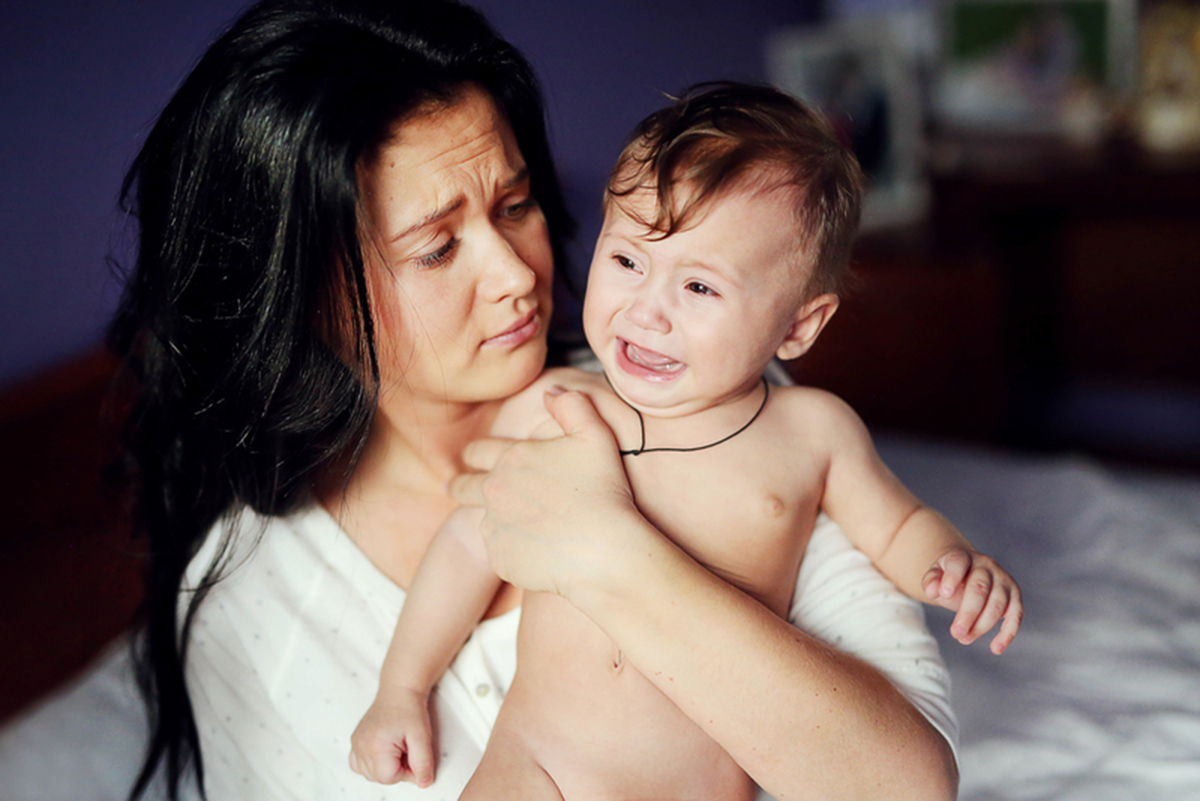Most new mothers — up to seven in 10, actually — experience a phenomenon known as the "baby blues". This can involve crying for no particular reason, wondering how on earth you're going to take care of this whole human, quite intense worries that you're not ready or you're going to do something wrong, and feeling grumpy. The baby blues may be caused by a combination of changing hormones, sleep deprivation, and existential questions that new parents can face. They do not require medical attention and typically subside rather quickly.

Postpartum depression is a different beast. Affecting around 10 to 15 percent of new mothers every year, it is much more serious than the baby blues and is quite likely not to "go away on its own".
Postpartum depression: What you need to know about diagnosis
The current version of the diagnostic and statistical manual of mental disorders (DSM-5), a rather long document also informally called the "psychology bible", doesn't actually list postpartum depression as a separate diagnosis. Rather, people have to meet the diagnostic criteria for major depressive disorder. A specifier, "with peripartum onset", can then be added.
"Peripartum" means something like "around the time of delivery", so that includes the later stages of pregnancy as well as the four weeks after you give birth. The specifier is "peripartum" rather than postpartum, because around half of all women with this form of depression will actually start experiencing symptoms before they have their babies.
Now that that's out the way, here are the symptoms of depression:
- A depressed mood
- Loss of interest in all or most daily activities
- Changes in appetite and consequently weight
- Insomnia or sleeping too much
- A physical speeding up or slowing down
- Loss of energy or fatigue
- Feelings of guilt or worthlessness
- Being unable to focus and/or indecisive
- Recurrent thoughts about suicide or death
Now, being fatigued, appetite changes, physical slowing down are all pretty normal during the postpartum period, so it's up to your doctor to be careful about the diagnostic process. We should also note that symptoms that aren't listed in the DSM-5 but that can strike in depression in new mothers include:
- Feeling indifferent about your baby, or having trouble bonding (this can fall under "loss of interest")
- Feeling like a bad mother (which falls under guilt or worthlessness)
- Feelings of harming your baby (linked to suicidality)
Postpartum depression: What treatment options do you have?
1. Antidepressants
If you are not breastfeeding, your doctor will prescribe the antidepressant that they generally determine to be best for you. If you are nursing, the fact that antidepressants can cross into breast milk will be taken into account. Antidepressants suitable for you will include:
- Sertraline (Zoloft)
- Paroxetine (Paxil)
- Nortriptyline (Pamelor)
- Fluoxetine (Prozac)
- Citalopram (Celexa)
Should you have suffered from depression before and did well on one of these medications, the same one will likely be prescribed to you again.
2. Talk therapy
Talk therapy can play a very important role in helping people suffering from any kind of depression overcome it. Interpersonal therapy, psychodynamic therapy, and cognitive behavioral therapy are the approaches that have been researched most, and that are most likely to be recommended to you. In many cases, talk therapy programs are relatively short, consisting of around eight sessions, once a week. You may start feeling better pretty soon.
3. A combination of talk therapy and antidepressants
Depending on the severity of your depression, your doctor can also recommend a combination of both talk therapy and antidepressants. This "dual-action" approach helps you work on underlying emotional issues while also giving you the change in brain chemistry that antidepressants offer.
4. In-patient care
In cases of very severe depression, in-patient care may be recommended to you. People who benefit from in-patient care might be those who are feeling acutely suicidal or have repeated thoughts about harming their babies.
5. Lifestyle steps
As you recover from depression, you may find it extremely helpful to exercise regularly, seek out meditation, spend time outside, and socialize with supportive people in your life. All these steps have been shown to be beneficial for depressed people in study after study.
A word of encouragement
Research shows that many women with postpartum depression are reluctant to seek treatment, for reasons that can include:
- Fears that others will judge them negatively, and think them bad mothers, if they openly talk about how they are feeling.
- Worries that treatment will mean time away from your baby, which can be logistically difficult to organize.
- Being uninsured and unable to afford treatment.
If you have any of these worries, remember that postpartum depression — and depression in general — is extremely common. Your healthcare provider will be very familiar with it and is unlikely to judge you. Many of your friends and relatives will be familiar with postpartum depression, too, and you are likely to receive support rather than judgment. While postpartum depression can be treated, staying depressed will impact both your quality of life and your baby's, so making accessing treatment a priority is usually the right thing to do. With the right treatment, you can start feeling better within a few weeks. That is so very much worth it.
- Photo courtesy of SteadyHealth
- www.psychiatry.org/patients-families/postpartum-depression/what-is-postpartum-depression
- www.ncbi.nlm.nih.gov/pmc/articles/PMC5941764/
- online.epocrates.com/diseases/51236/Postpartum-depression/Diagnostic-Criteria
- www.ncbi.nlm.nih.gov/pmc/articles/PMC4101986/
- www.ncbi.nlm.nih.gov/pmc/articles/PMC4101986/


Your thoughts on this